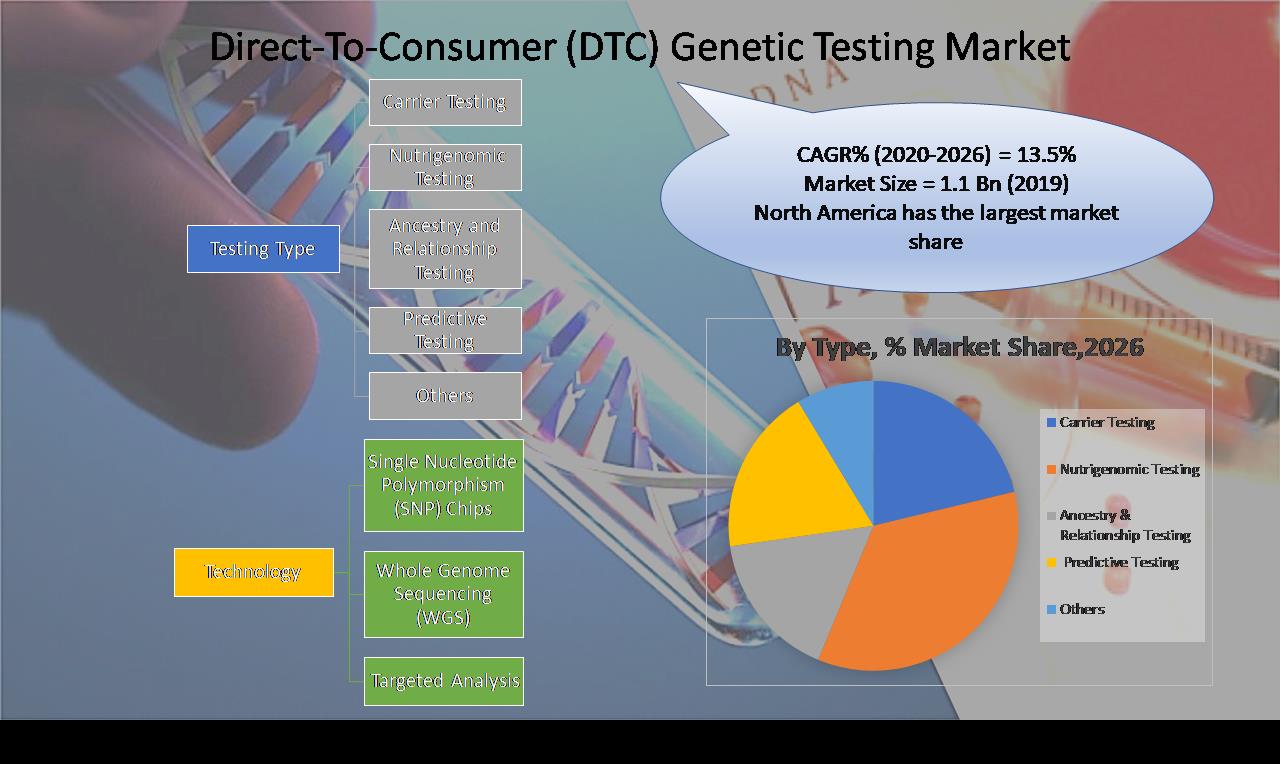Direct-To-Consumer (DTC) Genetic Testing Market (By Test Type - Carrier Testing, Nutrigenomic Testing, Ancestry & Relationship Testing, Predictive Testing. By Technology - Single Nucleotide Polymorphism (SNP) Chips, Whole Genome Sequencing (WGS), and Targeted Analysis. By Distribution Channel - Online Platforms, and Over the Counter. By Geography - North America, Europe, Asia Pacific, Latin America, Middle East, and Africa) - Global industry analysis, size, share, growth, trends, and forecast, 2020 - 2026.
Report Type : Syndicate Report
The Global Direct-To-Consumer (DTC) Genetic Testing Market was $1.1 Bn in 2019, and it is expected to reach $2.7 Bn by 2026. It is eventually growing at a commendable high compound of annual growth rate CAGR of 13.5% between 2020-2026. However, the current pandemic of COVID-19 might make a slight difference in the growth rate in the present year. The Direct-To-Consumer (DTC) Genetic Testing Market is majorly driven by some of the factors such as rising genetic disorders globally. Increasing genetic diseases such as breast cancer, achondroplasia, colorectal cancer, and other diseases are expected to propel the market to grow rapidly. Further, high-quality DTC genetic testing can significantly reduce the mortality rates of cancer patients. This significant benefit of DTC genetic testing along with raising public awareness, increasing income level in emerging economies, and rising demand for service personalization may propel the Direct-To-Consumer (DTC) Genetic Testing Market in the forecast period.
Global Nutrigenomic Testing Segment Is Estimated to Witness Remarkable Growth

Source: SAI Research
The global Direct-To-Consumer (DTC) Genetic Testing Market has been segmented into Test Type, Technology, and Distribution Channel. By test type, the global Direct-To-Consumer (DTC) Genetic Testing Market is divided into Carrier Testing, Nutrigenomic Testing, Ancestry & Relationship Testing, Predictive Testing, and Others. By technology, the global Direct-To-Consumer (DTC) Genetic Testing Market is divided into Single Nucleotide Polymorphism (SNP) Chips, Whole Genome Sequencing (WGS), and Targeted Analysis. By Distribution Channel, the global Direct-To-Consumer (DTC) Genetic Testing Market is divided into Online Platforms, and Over Counter. The nutrigenomic testing segment is projected to witness remarkable growth in the forecast period. The reason behind the growth of the market is increasing research activities related to nutritional aspects. This enables professionals to help recommend the nutrition and diet to control obesity and maintain a healthy lifestyle.
By Region, North America is Holding the Major Market Share
The global Direct-To-Consumer (DTC) Genetic Testing Market has been geographically segmented into North America, Asia Pacific, Latin America, Middle East, and Africa region. In addition to this, Europe Direct-To-Consumer (DTC) Genetic Testing Market is holding the largest market share currently and is estimated to show the fastest compound annual growth rate in the upcoming forecast period due to factors such as the increasing trend of genetics testing and rising expenditure.
The surging genetics disease such as cancer, spinal muscular atrophy neurofibromatosis, and turner syndrome is expected to boost the market of DTC genetic testing in the region. Moreover, the high disposable income empowers consumers to spend more on DTC genetic testing which is expected to trigger market growth in the forecast period. The European market is also projected to show decent growth over the forecast due to rising incidents of hereditary cancer in the region. The Asia Pacific and LAMEA region is also anticipated to witness improving growths in the forecast period from 2020 to 2026.
Major Players in Global Direct-To-Consumer (DTC) Genetic Testing Market
Some of the key players in the global Direct-To-Consumer (DTC) Genetic Testing Market include Ancestry, Color Genomics, Easy DNA, FamilyTreeDNA (Gene By Gene), Full Genome Corporation, Helix OpCo LLC, Identigene, Karmagenes, Living DNA, Mapmygenome, MyHeritage, Pathway genomics, Genesis Healthcare, 23andMe, Myriad Genetics, and Quest Diagnostics.
The Global Direct-To-Consumer (DTC) Genetic Testing Market Has Been Segmented into:
Global Direct-To-Consumer (DTC) Genetic Testing Market: By Test Type
- Carrier Testing
- Nutrigenomic Testing
- Ancestry & Relationship Testing
- Predictive Testing
- Others
Global Direct-To-Consumer (DTC) Genetic Testing Market: By Technology
- Single Nucleotide Polymorphism (SNP) Chips
- Whole Genome Sequencing (WGS)
- Targeted Analysis
Global Direct-To-Consumer (DTC) Genetic Testing Market: By Distribution Channel
- Online Platforms
- Over the Counter
Global Direct-To-Consumer (DTC) Genetic Testing Market: By Region
- North America
- USA
- Canada
- Mexico
- Rest of North America
- Europe
- UK
- Germany
- France
- Spain
- Italy
- Russia
- Rest of Europe
- Asia Pacific
- India
- China
- Japan
- South Korea
- Rest of Asia Pacific
- Latin America, Middle East & Africa
- Brazil
- South Africa
- UAE
- Rest of LAMEA
Buy Chapters or Sections
Customization options available to meet your custom research requirements :
- Request a part of this report
- Get geography specific report
- Request historical analysis
- Check out special discounted pricing

